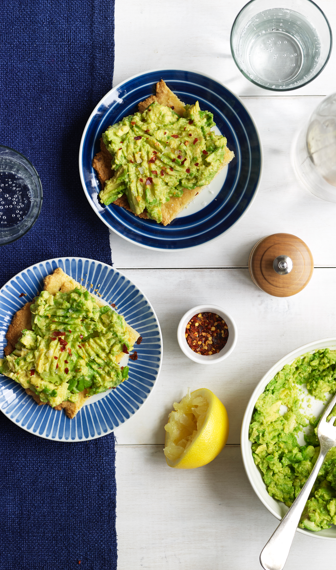There are plenty of reasons why a low-carb diet like Atkins is beneficial—it helps you lose weight, plus it lowers your risk of heart disease, stroke and diabetes. But did you know that the Atkins Diet is good for your skin, too?
Breakouts, sensitive skin, how your skin looks and feels and even how quickly your skin ages may be affected (to some extent) by the food you eat. Why is this? To start with, the typical American diet is too high in omega-6 fatty acids (typically found in processed and fast foods) and too low in omega-3 fatty acids (found in seafood like tuna and salmon, walnuts, canola oil and flax seeds and more). When this ratio is out of whack, inflammation sets in. What is inflammation? It is your body’s response to a perceived threat—whether it’s a splinter in your finger, sunburn at the beach, a zit or a sprained ankle. In fact, inflammation is actually part of the body’s natural healing process. But when your body becomes imbalanced, it loses its ability to produce anti-inflammatory chemicals to counteract that inflammation. In addition to an out-of-balance omega-6 to omega-3 ratio, high stress levels and excess body fat contribute to chronic inflammation. Another important weapon in controlling inflammation is avoiding foods that spike insulin levels, such as simple carbohydrates, sugar and white flour. Simple carbs and white sugar and flour also raise your levels of the stress hormone cortisol, which also leads to breakouts. So, in simple terms—that delicious cookie that looks so tempting not only adds inches to your waistline but years to your face and maybe a couple zits to boot!
Another important weapon in your “good skin” arsenal is foods high in antioxidants. Free radicals damage the membrane of skin cells (leading to inflammation, sun damage and an increased risk of skin cancer). But antioxidants and phytochemicals, which are found in fresh fruits and vegetables, protect the membrane of the skin cells from those nasty free radicals.
The Atkins “Good Skin” Food List
1. Seafood
Salmon, tuna and mackerel have the highest amount of omega-3 fatty acids and are acceptable in every Phase of the Atkins Diet. In addition, studies show adding fish to your diet can also help reduce the inflammation associated with psoriasis and even eczema. Tuna is also rich in selenium, which helps prevent breakouts. Try to eat seafood at least three times a week.
2. Nuts, seeds and flax
Walnuts, almonds, pecans and other nuts and seeds are packed with omega-3s. You can add nuts and seeds into your plan after two weeks on Induction or when you move to Phase 2. You can also add flax seed to muffins—the Almond Muffin in a Minute recipe has a ¼ cup of Almond Meal Flour and is perfect starting in Phase 2.
3. Olive oil
It’s a great source of omega-3s and antioxidants. Look for extra virgin olive oil that is “cold pressed” or “expeller pressed.” A serving is 1 tablespoon, and your skin needs at least 2 tablespoons of oil a day to keep it supple and moisturized. You can cook with olive oil or use it to make salad dressing, or just drizzle it over your salad.
4. Fruit
Berries and many other fruits are full of free-radical-fighting antioxidants. Starting in Phase 2, you can add fresh blueberries, raspberries, strawberries and cantaloupe or honeydew melon, and you can add even more fruits in Phases 3 and 4.
5. Vegetables
You can never have too many vegetables and all the healthy antioxidants they provide. Even in Induction, you should be eating between 12 and 15 grams of net carbs of a variety of vegetables every day. Pile on the leafy greens, plus squash and pumpkin. Once you hit Phases 3 and 4, you can have sweet potatoes, which are a good source of vitamin A.
6. Green tea
It’s rich in polyphenols called catechins, which are anti-inflammatory antioxidants. Some research shows that green tea may also have some UV-protective properties, meaning it could help protect your skin from cancer-causing sun rays. To get the biggest boost, drink three cups of freshly brewed a day (vs. decaffeinated, instant or ready-to-drink versions, which are less potent).
7. Water
When it comes to your skin, hydration is key. Water keeps your skin healthy and young by moving nutrients in and flushing toxins out. Focus on drinking the recommended eight glasses a day (or more).

